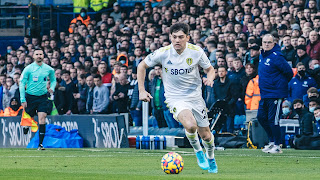Clarity of Forshaw - The Square Ball 24/1/22
ALL SEEING
Written by: Rob Conlon
For over two years, Leeds United got by without Adam Forshaw
just fine. Ten Premier League starts later, and Leeds’ line up to face
Newcastle felt like it was missing a crucial element when he wasn’t risked due
to a minor hamstring injury.
Forshaw was back on the gantry, helping out Bryn Law and
Tony Dorigo on LUTV commentary, hoping for more laughs after also filling in
for the win against Watford earlier this season. Sometimes you want a
footballer to provide an insight that’s beyond us mere mortals in the stands,
but sometimes it’s nice for an expert to confirm our own eyes aren’t deceiving
us.
Much like the game against Watford, Forshaw was enjoying
what he was watching in the first half, praising Dan James for “igniting”
Elland Road by flying into a tackle, and bigging up Jackie Harrison in front of
England boss Gareth Southgate. If Southgate was at Elland Road watching Kieran
Trippier, he’ll have noticed Harrison sprinting into the space where the
right-back was meant to be time after time in the first half.
All Leeds were lacking was a goal, and Forshaw articulated
the frustration surrounding James’ role when playing as a centre forward.
James’ pace and work rate ultimately forced two Newcastle defenders crying off
with injuries, but a career spent on the wing means he lacks the instinct to
make runs required to score inside the penalty area. “There’s been a few times
when all it takes is somebody to just get across the front post and they’ve
almost got a tap in here,” Forshaw said. When Dorigo mentioned James’ struggles
against defenders with his back to goal, Forshaw replied, “It’s not him, is
it?” Bielsa wants his squad to be able to play in multiple positions, but there
will always be certain skills inherent in a player’s DNA. Watch how Joffy
Gelhardt uses his arse brilliantly to get between his defender and the ball in
comparison to James; neither is a big, physical striker, but you can tell which
one has spent their development mastering the tricks of a number 9.
Forshaw sounded calmer than the crowd, but he was struck by the same problem that has plagued Bielsa throughout his time at Leeds. “It’s an obvious and easy thing to say, but we could really do with a goal for all the dominance we’ve had,” Forshaw said. It is an obvious and easy thing to say, but evidently a much harder thing to do.
After Newcastle stole a 1-0 win through Jonjo Shelvey’s
free-kick, Bielsa admitted he wasn’t quite sure why Leeds failed to score and
allowed momentum to subside. “Normally in the games where you could score and
you don’t, some detail unbalances the game against you. And I have the
sensation that is what happened,” he said, unable to put his finger on exactly
what that detail was. Newcastle’s time wasting certainly didn’t help. Simon
Grayson still blames Leeds’ play-off semi-final defeat to Millwall on their
defender Paul Robinson going down with a head ‘injury’ shortly after Luciano
Becchio had blown the roof off Elland Road by levelling the tie. Whenever Leeds
showed signs of breaking out into Bielsaball, a Newcastle player suffered their
own ‘injury’, giving their teammates a chance to regroup and dampen the buzz
around the stadium.
Forshaw may have put his finger on another small detail that
changed. On Newcastle’s left wing, Allan Saint-Maximin was playing ahead of
striker-turned-central-midfielder Joelinton. Neither player is known for their
defensive work, leaving Paul Dummett exposed against Raphinha. Bielsa was
confused why Leeds’ more positive play came down Harrison’s left and not
Rapha’s right, describing the latter as “our most unbalancing player.” But
Rapha dragging Newcastle out of shape on the right was helping create space for
Harrison on the left. Bielsa later swapped the players over, which is always a
sign something is going wrong, “and from there on, the opposite happened. The
ball started going down the right where Raphinha was playing initially.” It may
or may not be a coincidence Leeds’ best spell of the game came to an end when
Joelinton was injured and replaced by Sean Longstaff, a more natural midfielder
adding to Newcastle’s defensive numbers whenever Leeds attacked.
Bielsa also said Leeds lacked “clarity” in the final twenty
minutes, when Leeds’ chances dried up and Newcastle held on to win all three
points. Asked whether Forshaw’s absence was an issue in this regard, Bielsa
disagreed:
“No, the role of Forshaw, Klich occupied it today. And at
the end of the game we had two offensive midfielders who had the capacity to
unbalance like Tyler and Rodrigo, with five players in front. I don’t think the
characteristics of Forshaw would have improved this situation. Because Tyler
and Rodrigo are players who have the characteristic to find that final pass and
also to receive it. Forshaw is the player who links himself between our
defensive mid and our attacking mid but less with our number 9.”
Watching from the gantry, Forshaw had a different
perspective. He had earlier picked out a pass cutting through Newcastle’s
midfield from Pascal Struijk to Mateusz Klich as the type of ball Leeds needed
to be able to attack the visitors in dangerous positions. With Klich replaced,
Leeds had Robin Koch holding the midfield and Roberts and Rodrigo joining the
attack. Now there were Leeds forwards aplenty lining up on the edge of
Newcastle’s penalty area, but with nobody to pass them the ball, Ayling, Dallas
and Llorente were reduced to chipping hopeful crosses that were easily picked
off or floated safely out of play. “As counterproductive as this sounds, I
think we need to be slower in the build up,” Forshaw said as Newcastle were
winning a corner in stoppage time. “As we go long, we’re hitting people who
aren’t good in the air. We need to realise there are three or four minutes left
and as much as it sounds like [we’d be] slowing the build up it’s not going to
work any other way.” Shortly afterwards Ayling punted a pass towards Roberts,
who headed the ball up into the air with no Leeds player near him and no other
option.
I’m not sure I really want to criticise Bielsa for throwing
everything into attack, always looking for ways to get another offensive player
on the pitch. In such scenarios I always think back to the game at Nottingham
Forest in Bielsa’s first season when, trailing 1-0 and down to ten men, his
answer to the problem was leaving Pontus Jansson on his own in defence and
telling everyone else to attack and try and win the game. It was exhilarating
to see Nottingham Forest look so bewildered, so frightened by a team of such
lunatics as Leeds went 2-1 in front. But we still lost 4-2 anyway. Pep
Guardiola might be a disciple of Bielsa, but when Manchester City’s visit to
Elland Road turned into a basketball match last season, he responded to the
freedom to attack by bringing on defensive midfielder Fernandinho, giving City
control that made them all the more dangerous. “This is when they started to
impose themselves on the game once more,” Bielsa said after that 1-1 draw. “It
was a very intelligent substitution and it had a big influence on the game,
which indicates a lot of the time that you have to defend better so you can
attack well.”
But do we really want Bielsa to start being more sensible?
Forshaw’s theory was sound, but even he didn’t sound fully convinced. Dorigo
had already made the basketball comparison against Newcastle when he asked, and
answered, “What’s going on with the midfield? Well, there is none.” Forshaw
knows better than most what a Bielsa midfield looks like: when you’re so busy
defending and attacking, quite often there isn’t much in between, by design.
This is what Leeds do. “You said earlier on it’s like a game of basketball, but
how many times have you said that over the last three years?” Forshaw
countered, and this time Dorigo didn’t have an answer.
Leeds might not always play with a midfield, but that
doesn’t mean they should play without midfielders. An afternoon that ended in
disappointment at least started with some positive news. As Bryn Law introduced
Forshaw to commentary, he was asked whether he would be fit to face Aston Villa
after the international break. We’ve only just been able to enjoy having
Forshaw back in the team, and if defeat to Newcastle was anything to go by, we
don’t want him missing any longer. Thankfully he gave the answer we all wanted
to hear: “Definitely.”

